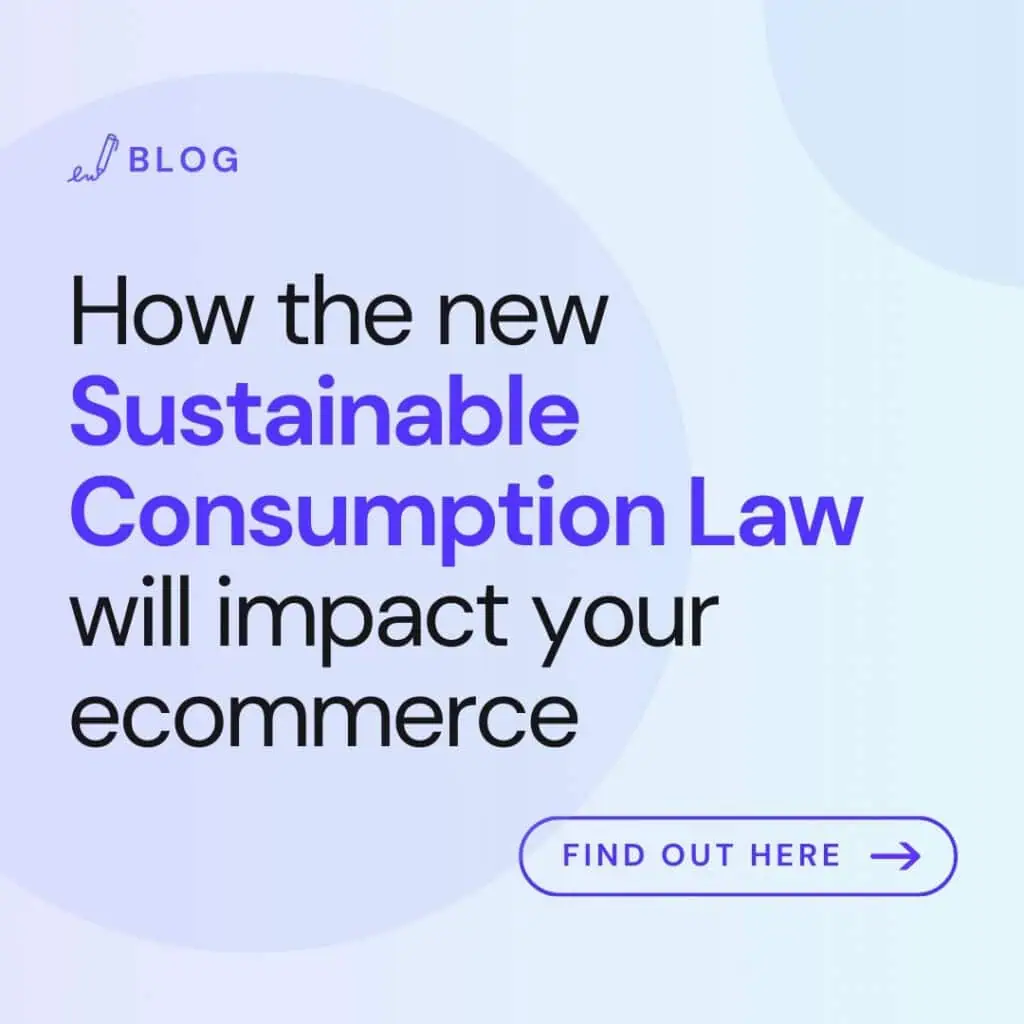If you run an ecommerce or marketplace, take note: significant legislative changes are coming. Full transparency in prices, reviews, warranties, repair, and advertising will become the new norm.
What every ecommerce should know about the Sustainable Consumption Law
On July 4, 2025, the Ministry of Social Rights, Consumer Affairs and the 2030 Agenda presented the Draft Bill of the Sustainable Consumption Law. The proposal anticipates a profound redesign in the way digital businesses inform, sell, and interact with consumers, with the main changes expected to come into force throughout 2026.
This law transposes two key European Union directives:
- Directive (EU) 2024/825, on empowering consumers in the green transition.
- Directive (EU) 2024/1799, strengthening the right to repair.
It also introduces its own measures that will directly affect websites, marketplaces, and digital businesses. Its objective: to reinforce consumer protection, ensure clear and truthful information, and eliminate unfair commercial practices.
Do you run an ecommerce or sell digital services? Here’s what you need to know and apply.
1. Clearer product pages: no more fine print
One of the major changes will be the obligation to provide clear, accessible, and visible information before purchase. This means redesigning product pages, checkout flows, and terms and conditions.
You will need to include:
- A standardized notice about the legal warranty.
- A durability label if you offer free commercial warranties longer than two years.
- Information on repairability: spare parts, manuals, limitations… and if you provide repair services, you may offer customers the new European repair form with conditions and pricing.
- If you personalize prices using algorithms, you must explicitly inform consumers before purchase.
- If you apply “shrinkflation” (less quantity, same price and packaging), you must disclose it for 90 days.
Transparency will no longer be a value-add: it will be a legal requirement.
2. Marketplaces and comparison sites: full transparency in algorithms
If you run an online marketplace or comparison site, you will need to be transparent about:
- How results are ranked (criteria used and their weighting).
- Whether sellers are professionals or private individuals.
- In “green” comparison sites, how products are selected, how often they are updated, and under what methodology.
3. Reviews: more credibility, less manipulation
User reviews will no longer be left to chance. Reviews must meet verifiable criteria:
- Indicate whether reviews are verified and explain how (e.g., through moderation, proof of purchase, or automated filters).
- It is prohibited to claim that all reviews come from real buyers if you do not apply reasonable verification measures.
Customer trust is now a legal requirement, not just a reputational choice.
4. Digital advertising: zero tolerance for greenwashing
Your environmental communication will be under close scrutiny. The following will be considered unfair practices:
- Using generic terms like eco, green, sustainable, or carbon-neutral without verifiable backing.
- Announcing future climate targets (“we will be carbon-neutral by 2030”) without a measurable plan and external audit.
- Using sustainability labels without official certification.
- Employing misleading naming or branding that creates a false impression of sustainability.
- Advertising fossil fuels and transport services that rely solely on fossil fuels, when less polluting alternatives exist for the same route whose travel time does not exceed the equivalent service by more than 2 hours and 30 minutes.
- Claiming climate neutrality based solely on CO₂ offsetting.
- Running campaigns with alarmist messages without an objective basis.
5. Software and digital products: transparency in updates
If you sell digital products or services, you will face new obligations:
- Notify users if an update could negatively affect product performance.
- Do not present an update as “necessary” if it only adds new features.
- Clearly inform customers about the minimum guaranteed update period.
6. Repairs and refurbished products
After-sales service is also changing:
- Clearly identify refurbished products throughout the entire purchase process.
- If the consumer chooses to repair instead of replace, the legal warranty is extended by 12 months.
7. Resale and branding: stricter rules
In ticket resale:
- The price may not exceed the original price plus inflation (CPI).
- The use of bots to hoard tickets is prohibited.
And regarding brand image:
- The use of corporate names that mislead consumers about sustainability is restricted.
- Advertising polluting transport and fossil fuels is prohibited if more sustainable alternatives exist.
Checklist for your ecommerce
- Review product pages and checkout to include warranties, durability, and repairability.
- Audit review management and explain the methodology behind rankings or comparison tools.
- Disclose algorithms, sponsorships, and personalized pricing.
- Remove environmental claims without verifiable backing.
- Strengthen after-sales service, including repairs, spare parts, and refurbished products.
- Ensure website and content accessibility.
Conclusion
The upcoming Sustainable Consumption Law represents a major shift in the way ecommerce and websites inform, sell, and interact with their users. Anticipating and adapting not only helps avoid potential penalties: it also strengthens trust and credibility in an environment that is increasingly demanding in terms of transparency and sustainability.
If you don’t know where to start or prefer to do it with guarantees, Lawwwing makes it easy. Our platform analyzes the critical points of your website, automates legal texts, and helps you stay compliant without complications.
Discover how Lawwwing can help you today.

